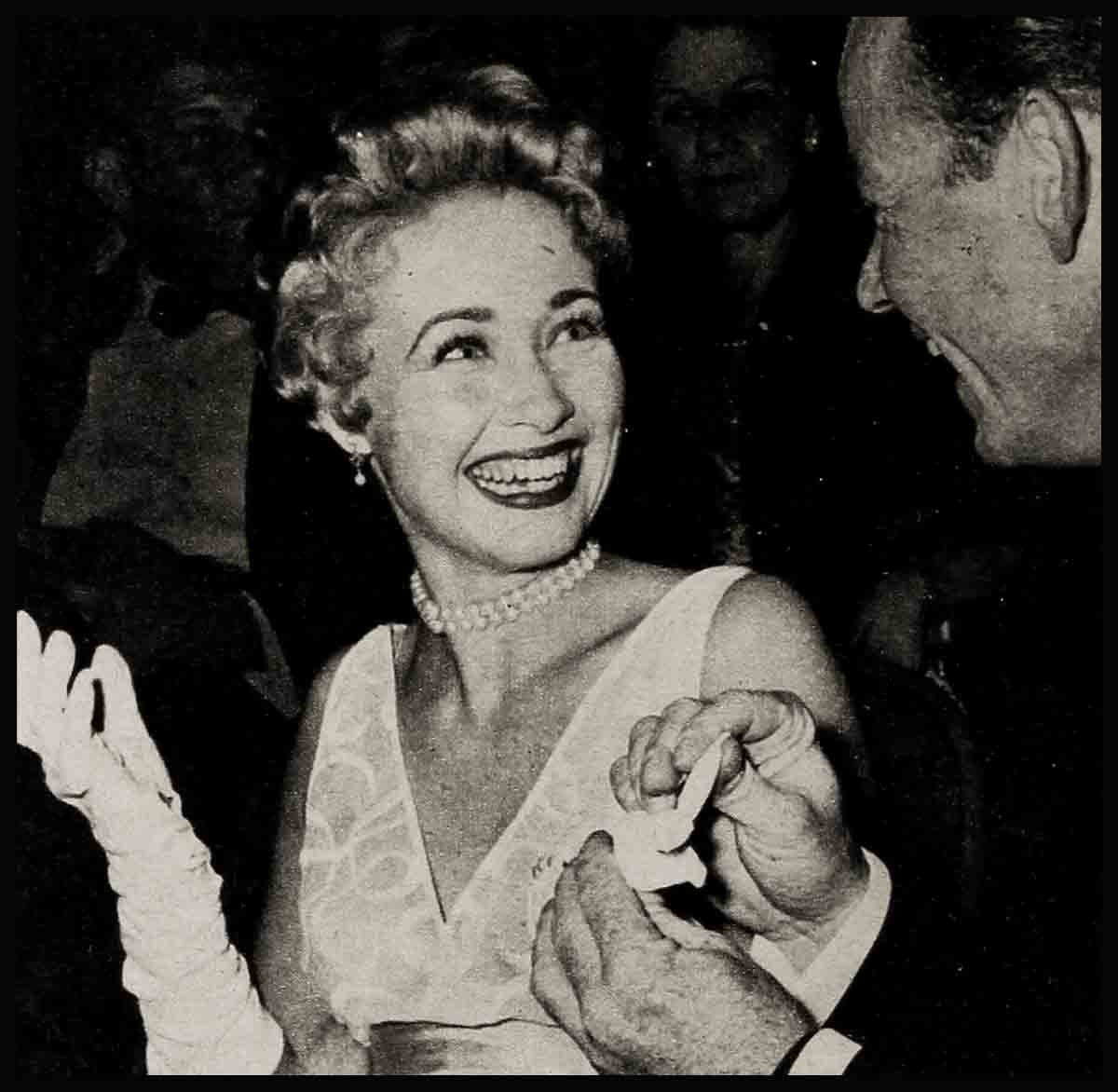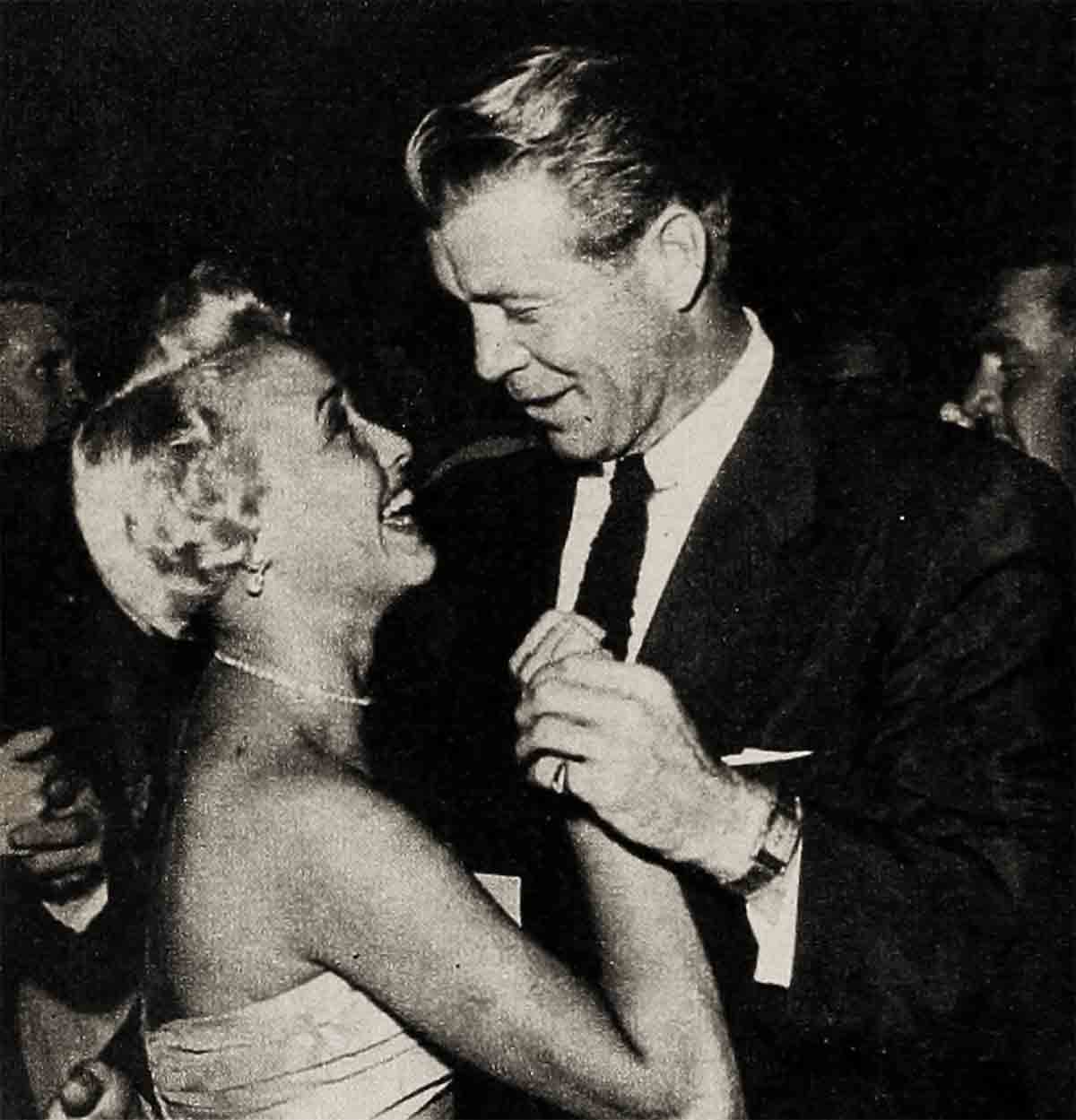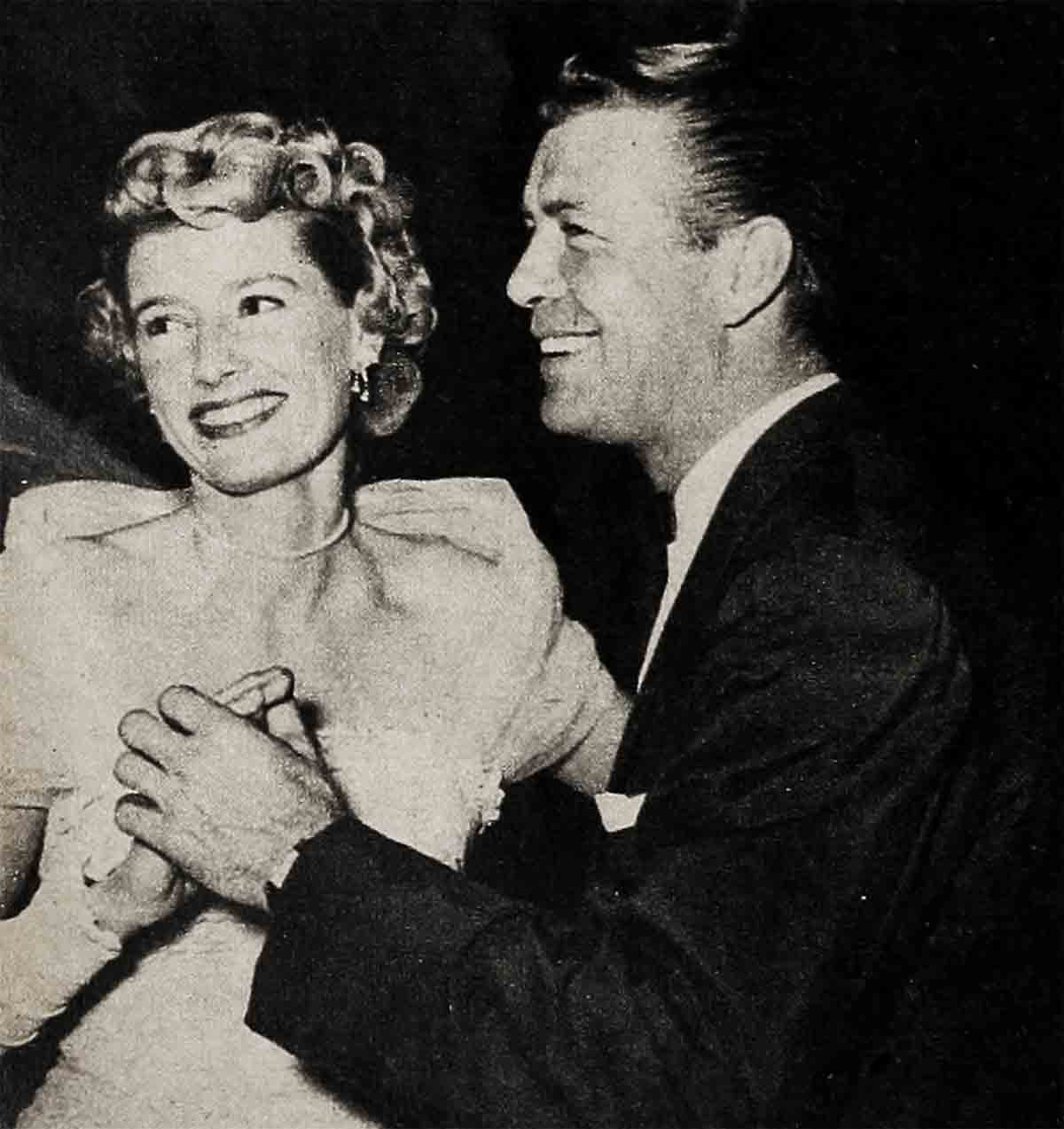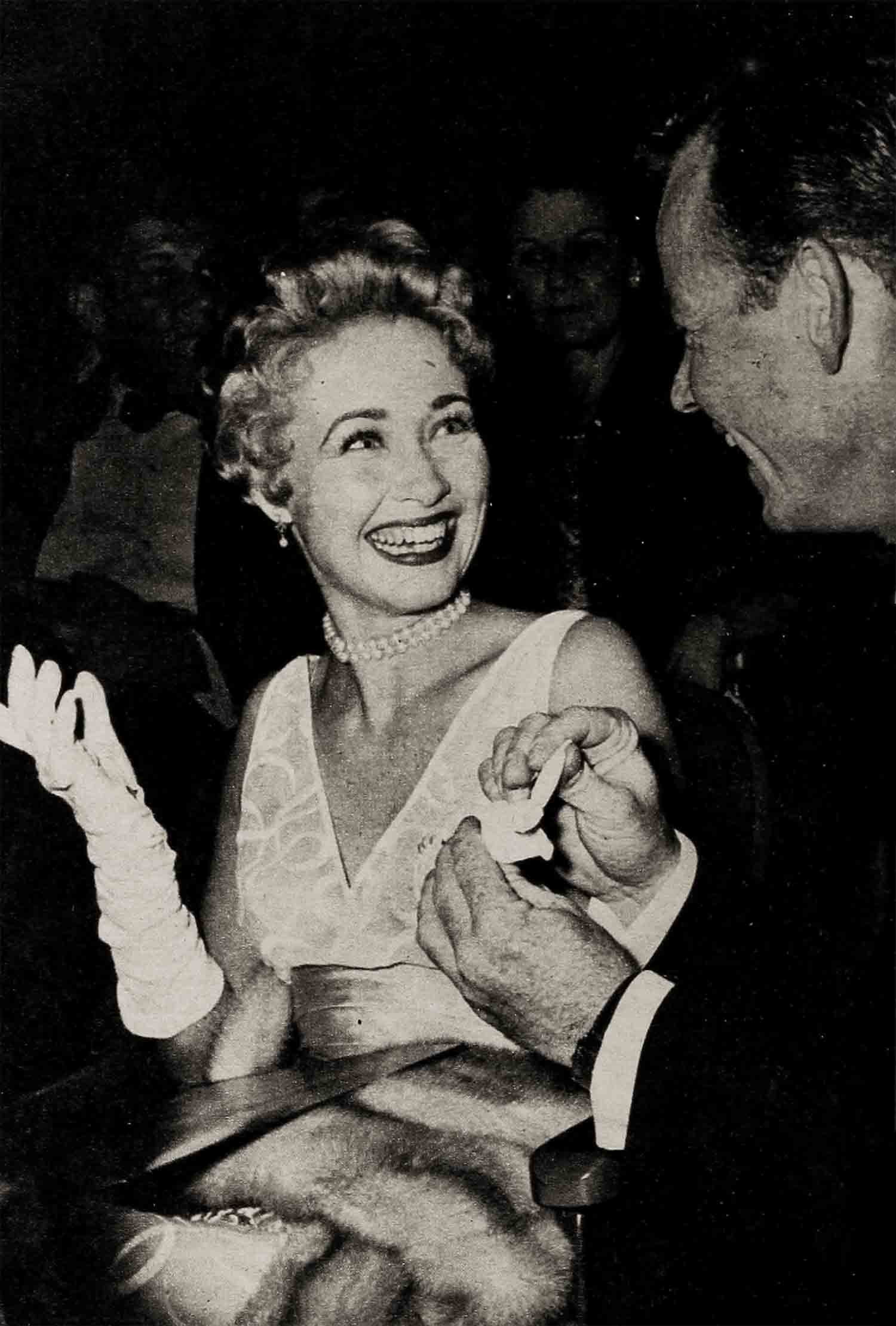
The Best Is Ahead—Jane Powell
Jane Powell has had a rough year. After basking in the sunshine of public approval for most of her life, she found herself groping through one of Hollywood’s longest, darkest tunnels.
Now light is showing up ahead. Both Miss Powell and her friends will tell you that. But their separate statements are not quite the same.
The friends—or, as they say in Hollywood, those on top of the situation—have the feeling that Jane’s present state of mind, gay and healthy, is neither more nor less than the consequence of her love for a young man named Pat Nerney who sells cars—and Pat Nerney’s love for her.
These witnesses are reasonably certain that the two will marry this summer, more than possibly by the time you read this, and live happily either ever after or for a somewhat lesser time.
Jane does not deny this but she does not affirm it. Her public utterances do not include the name Pat Nerney, although it is unlikely it has slipped her mind.
She does confess to dating one man a great deal of the time. She concedes that she cooks for him more nights than several. She even allows that he peddles automobiles. But she doesn’t tell his name. Therefore, if you prefer to regard it as Nerney, you do so on your own.
As to the happiness, Miss Powell is considerably more voluble. She attributes it to a kind of re-grouping of inner forces, new values, a new design for living. She does not say her association with Nerney didn’t trigger these, but she doesn’t say it did.
We come now to the long, dark tunnel through which Miss Powell presumably has been groping. Most people sidetracked into excursions of this sort prefer not to discuss them afterward and Jane Powell is no exception.

“I won’t talk about it any more,” she told an acquaintance recently. “It’s finis. Taboo. And if you want to know something else, I don’t think the public’s curious about it. I don’t think they want to hear about things like that—personal unhappiness and mix up. I’m a fan and I know I don’t. I like to hear about the up-beat side. Then again, how intimate can you get?
“I know the goldfish bowl argument—that if you happen to be in the public eye, you owe the public every last scrap of information about yourself. I guess I even once subscribed to it.”
There was a phase of Jane’s career in which she was less dian reticent. There were incidents about which she was less than reticent. In the flush of what she now refers to guardedly as “the trouble,” she talked with much more freedom than she does today. But if the broad picture is no longer available from her, it is available elsewhere. There are no cones of silence in Hollywood.
“All right,” said Jane. “Get it then. But I don’t believe any more in total revelation. There are limits. During the—the trouble—for instance, a friend of mine, a reporter, came to me, and said, ‘Break down, Janie. Give me the real, confidential dope, the inside story. The readers want it.’ Well, I wouldn’t. He was my friend, but I wouldn’t. There’s some place you have to draw the line as to what is people’s business and what isn’t, and that was the place. Well, he didn’t like it. He didn’t like it a bit. He thought I was trying to make things rough for him. But then—now listen to this—then later on, he, mind you, got into the same kind of difficulty. And one day he came to me and apologized. He said he understood now how Id felt about it. He didn’t want to give the real, confidential information, either, you see, now that he was on my side of the fence.”

Jane Powell was married in 1949 to a man named Geary Steffen (pronounced Gary, not Geery), a blondish fellow with a good deal of chin and a talent for figure skating so exceptional that he was, at the time of their wedding, leading man for Sonja Henie’s annual tours. When they married, however, Steffen put all that behind him to stay home and become a solid and industrious citizen, a successful insurance man.
Roughly 125,000 rhapsodic words were written about the union of Geary and Jane Powell Steffen and that’s the way it seemed to be. There were two children, a boy and a girl, a quiet and dignified life on a leafy, pleasant street in Brentwood.
It was not until after the birth of the second child that fissures began to show in the marital structure.
You can get yourself an argument both ways here, but majority opinion holds that Janie was getting a little fed up some months before she became actively aware of a dancer named Gene Nelson, alleged to be the cause of the ultimate split. At least one prominent woman star has said that Janie had only one beef, but it was a big one: Geary, after a good start, was letting the insurance business slide in order to sharpen his water-skiing. A less pleasant way of saying this is that Janie, though conscious that few husbands can match a film star’s salary, still felt that her mate ought to go through the motions.
The Steffen camp, on the other hand, contends that Janie, along about then, was getting to be the Movie Star in spades and that Geary wasn’t liking it at all.
Given this much, the time may have been fairly ripe for a break, and this came along when Jane met Nelson on a picture.

To put it not too delicately, there was hell to pay. Nelson had left his wife Miriam and their child. Soon, there wasn’t a doubt in the world that Gene was fond of Janie and Janie of Gene. The cover-up was attempted but reporters broke through. Steffen set his considerable chin and growled to a friend that he’d reconcile but Janie would have to make the first move. Janie wasn’t doing that. By and by, Janie played Las Vegas. Steffen was there. Janie’s opening night songs could not have been more unfortunate. Knowing her personal story, the audience became acutely embarrassed. Goodbye, baby, she sang, I’m leaving you. How could you believe me, she sang, when I said I love you, when you know I’ve been a liar all my life? Ouch!
But Steffen came backstage later and kissed her—on the forehead. Then he went back to Los Angeles. Onlookers reported faithfully that he looked like a man who’d been hit by a pool ball.
Janie told the press she was going to think things over. She did. Then she came home and divorced Steffen, decree effective momentarily.
Four lives had been damaged, excluding children as no more than problematical casualties. Jane and Geary had gone their separate ways. The Nelsons’ estrangement has not proved other than hopeless. But fate had still another rabbit-punch to wing Janie’s way. She fell out with Nelson, and so came to the darkest, most noisome part of her personal tunnel. There was, it seemed, nothing left to salvage.
But there was. There was life to salvage.
Although Nerney, too, maintains silence under a mutual consent pact with Jane, there is no doubt in the minds of those who know him that they will marry at their earliest convenience. Nerney is an engaging, hard-working man, not wholly unlike Steffen in personality but a rather far cry from Nelson. He is devoted to Janie’s children. And the word is that he can take water-skiing or leave it alone.
Steffen no longer talks for publication on the mess in general, feeling with some correctness that anything he said now would be superfluous. But Hollywood thinks that he, too, is finding his way back to a normal life, appearing on the town now and again and reportedly working harder than he has for some time.

Nelson has been seeking reconciliation with his wife, but without any conspicuous success. Miriam Nelson, thought by many to have been the one clearly outraged party seems to be the happiest of the four today. She gets around, shows every evidence of genuine gaiety and none of emotional strain.
Jane Powell and Miriam Nelson ran into one another at a party the other night. Jane saw Miriam first and made a motion as though to leave, but it was too late. Miriam had turned. A few seconds later, the two were in warm conversation, punctuated by chortles. Thus they relieved their host of the necessity of shooting himself.
There is no word to date of Steffen and Nelson’s setting up shop together, but perhaps it’s only a matter of time.
“It’ll seem funny,” Jane said, “coming from me, but at last, happiness is getting to be something I know about. I have learned this for a beginning: the future is a dream and the past is dead. When something is done, it’s done, and you turn your back on it. You live in the present, and if you do look forward a little, it’s to something real and tangible and not so far ahead you can’t even see the outlines.
“Right now, I’m working on this picture, Athena, for Metro. And when I go home tonight, I’ll cook or I’ll be with the children—excuse me, I’ll cook and I’ll be with the children. On Monday nights, I go to painting class. Busy. Oh, it’s so important to keep busy, keep active. Or it is for me. That’s what I’ve found out—the wonder of living from day to day.”
Hollywood is now on a terrific kick about the power of positive thinking, but Janie denied that this was precisely what she had in mind.
“No, it’s just living, instead of regretting or dreaming. I never want to look back again. I never want to look too far ahead. I want to be, right where I am and at the moment I’m there. Does that make sense? I’ve found happiness in the simplest things, like eating and seeing the sun rise and set or be any place it happens to be. In being with people or being alone. There’s so much I’ve never imagined.
“Here’s another one—reading. I’ve discovered reading! Can you imagine that? I’ve never read before. Now I read all the time. In the Powell household, reading has threatened television. I don’t watch tv much any more—and I used to be one of those who couldn’t live without it.
“And painting! I mentioned painting. I’m simply terrible at it but I love it. I started with houses. Ive graduated to elbows now. Some day I’ll even paint something you can recognize. I could paint tonight. Maybe I will. Play with the children. That’s how it is with me these days. I’m a shut-in but I love it. No nightclubs. Not many parties. Once in a while is all. Now and then I go downtown to the theatre. That’s a big night. But this evening—well, maybe he won’t be by until nine because he has to work late, and we’ll just sit for a while.”
You note the bland use of “he.”
“You know,” said Janie. “My date.”
And why wouldn’t he be there till nine?
“Because of his work.”
Which was?
“Insurance,” said Janie. The silence was appalling and prolonged. “What did I say?” said Janie. “Insur—Oh, no! Cars! He sells cars! Insurance, yet! My goodness!”
Happiness, as someone must have said before, is an elusive thing. Often it is not for those whom life embraces too fiercely and too soon—child screen stars, for example. Whether these become emotionally jaded, or suffer the let-down common to youngsters who are given their dessert first, or simply are not allowed to grow in the orderly progression that is supposed to lead to well-adjusted adulthood—that’s for the experts to decide.
But a lot of times they have it rough—as rough as Janie Powell has had it.
Jane was born on April Fool’s Day, cute as any baby, the daughter of Paul and Eileen Burce of Portland, Oregon. But she grew up with a remarkable singing voice, and her life became unlike that of most cute babies.
Jane Powell says all she has missed from not having a normal childhood is playing with other children. She regrets that, but she will not link it with marital catastrophe—nor blame heartbreak on premature fame.
Besides, you know, all that is past. Dead. She’s turned her back.
Yet Hollywood is curious to know whether she can turn her back forever. The optimists think she will marry Nerney and enjoy a happiness greater than any she has ever known. Others have a foreboding that the past never can be left fully behind, and that one dark day the shock of another setback will possess her.
But the optimists are more numerous and more convinced.
They point to the poised, courageous comportment she has exhibited from the start of the trouble, to her unflinching acceptance of a none too sympathetic role that became public property, to a touching dignity throughout an excruciating ordeal.
If she can weather all that, her admirers say, she’s already over the hump, and the best is ahead.
THE END
—BY JOHN MAYNARD
(Jane Powell is now appearing in MGM’s Seven Brides For Seven Brothers.)
It is a quote. MODERN SCREEN MAGAZINE SEPTEMBER 1954





No Comments